The Carey Treatment Blu-ray Movie
HomeThe Carey Treatment Blu-ray Movie 
Warner Archive CollectionWarner Bros. | 1972 | 101 min | Rated PG | May 10, 2022
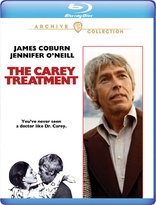
Price
List price:Amazon: $19.89 (Save 10%)
Third party: $19.89 (Save 10%)
Only 6 left in stock (more on the way).
Movie rating
7.2 | / 10 |
Blu-ray rating
| Users | 0.0 | |
| Reviewer | 3.0 | |
| Overall | 3.0 |
Overview
The Carey Treatment (1972)
At a Boston hospital, Dr. Carey becomes an amateur sleuth to help clear a colleague who's accused of botching an illegal abortion that kills a 15 year old girl.
Starring: James Coburn, Jennifer O'Neill (I), James Hong, Dan O'Herlihy, Pat HingleDirector: Blake Edwards
| Thriller | Uncertain |
| Crime | Uncertain |
| Mystery | Uncertain |
Specifications
Video
Video codec: MPEG-4 AVC
Video resolution: 1080p
Aspect ratio: 2.39:1
Original aspect ratio: 2.39:1
Audio
English: DTS-HD Master Audio 2.0 Mono (48kHz, 24-bit)
Subtitles
English SDH
Discs
Blu-ray Disc
Single disc (1 BD)
Playback
Region A (B, C untested)
Review
Rating summary
| Movie | 3.0 | |
| Video | 4.5 | |
| Audio | 4.0 | |
| Extras | 0.5 | |
| Overall | 3.0 |
The Carey Treatment Blu-ray Movie Review
Reviewed by Randy Miller III May 10, 2022Mostly carried by a reliably solid performance from star James Coburn, Blake Edwards' The Carey Treatment was a notoriously compromised production that, due to studio interference, was disowned by the late director and partially satirized in his later film S.O.B.. Our story follows skilled pathologist Dr. Peter Carey (Coburn) to his high-paying new job at a Boston hospital, where he reunites with old friend Dr. David Tao (James Hong) and meets lovely young dietician Georgia Hightower (Jennifer O'Neill). Soon after a young orderly is accused of stealing meds, real tragedy strikes: the chief doctor's 15 year-old daughter Karen Randall (Melissa March) dies after a botched illegal abortion† supposedly performed by Dr. Tao. Carey springs into defensive mode, diving down a deep rabbit hole as he peels back multiple layers of corruption and deceit inside the dead girl's inner circle of friends and family members.
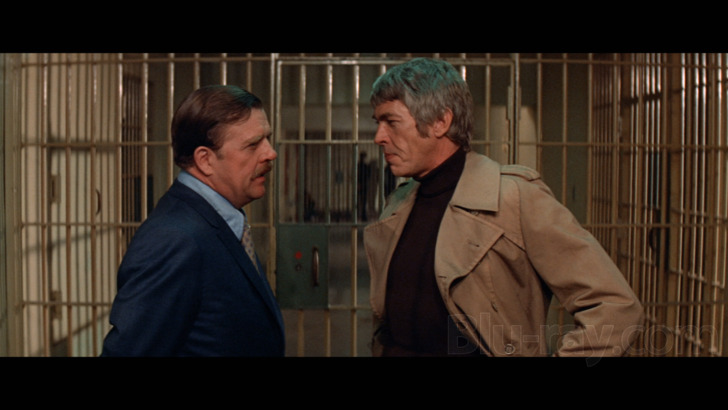
The film's main (only?) hook besides for its hot-button central death is Carey's no-nonsense brand of detective work. His default method is bullying suspects such as a young friend of the deceased, who he casually kidnaps and almost kills via reckless driving before just dropping her off. Other interactions also end with curiously minor consequences, including a surprise party guest who falls off a second-floor balcony (bloody nose), attempted murder when a creeping car smashes into a telephone booth (minor cuts and internal injuries, no biggie), and a drug addict bribed into telling the truth by withholding a morphine fix in front of authorities (no reprimand). Some of these laughably over-the-top moments are painted with Sam Peckinpah-grade blood effects that, unless you squint tightly, look more like creamy tomato soup or crimson-colored latex paint. It's kind of fun in a campy way, sure, but The Carey Treatment's central narrative would have been more believable had the good doctor been dialed back a few notches.
Based on the 1968 novel A Case of Need by Michael Crichton (his fourth and final book under a pen name, this one "Jeffrey Hudson"), The Carey Treatment is passable as a base-level thriller but struggles to keep interest as its thin story unfolds. Routinely diverting from its central plot in favor of dramatically inert exchanges and soapy twists, it's obvious that behind-the-scenes turbulence bled into the final product. Much of the friction was generated by producer William Belasco, who frequently berated director Edwards on set, and MGM's then-president James T. Aubrey, who was the eventual subject of a breach of contract suit launched by Edwards for shortening the film's shooting schedule by 10 days and rushing its theatrical release date. (His problems with the studio, which initially began during Wild Rovers, would continue into the next decade.) Coburn's charisma survives the tumult, as does the film's excellent location footage in and around 1972 Boston, but most everything else comes in a reasonably distant third place.
The Carey Treatment wraps up a shockingly slim month for Warner Archive, whose only other offering is the marginally better 1941 adaptation of Dr. Jekyll and Mr. Hyde. But whether they release the occasional dud or a stone-cold classic, the boutique label's restoration efforts are second-to-none, which will certainly please established fans of this odd little thriller from the early 1970s: it looks and sounds better than ever, even if the extras come up short.
† - The Carey Treatment was released less than a year before the Roe vs. Wade case, a historic decision that has never been overturned
and will ensure women always have domain over their own reproductive systems. Sigh...
The Carey Treatment Blu-ray Movie, Video Quality 
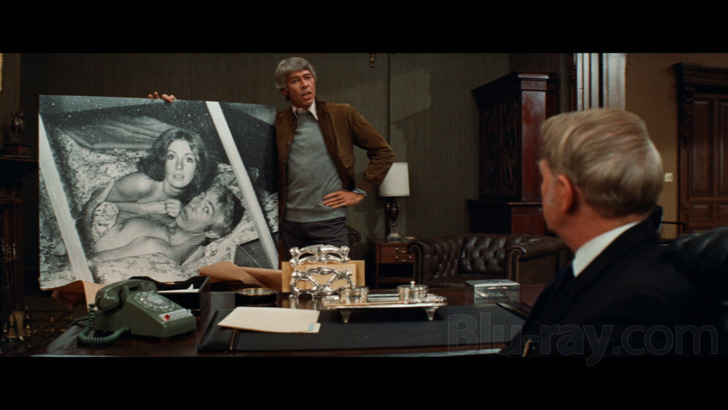
After a rather rough start due to its optical opening credits, The Carey Treatment looks every bit as good as other 1970s fare released by Warner Archive in recent years. Famously shot in and around Boston with excellent time capsule footage of the area, the film's rugged and gritty photography holds up quite well; though exact details of its restoration were not given on Warner Archive's May press release, this likely indicates a fresh 2K scan of the interpositive with automatic and manual clean-up of dirt, debris, and other age-related wear and tear. Film grain is fine but ever-present and only occasionally competes with noise in darker scenes, where shadow detail and depth can't help but flatten out a bit. Well-lit interiors and daytime scenes, in comparison, look extremely impressive, and the film's largely earth-toned palette -- tacky leisure suits and wallpaper aside, of course -- holds up nicely with accurate skin tones and and overall appearance that's extremely faithful to this unforgettable decade in cinema. Overall, it's fine work indeed and easily beats previous home video releases, the last of which was a remastered DVD from Warner Archive in 2011.
The Carey Treatment Blu-ray Movie, Audio Quality 
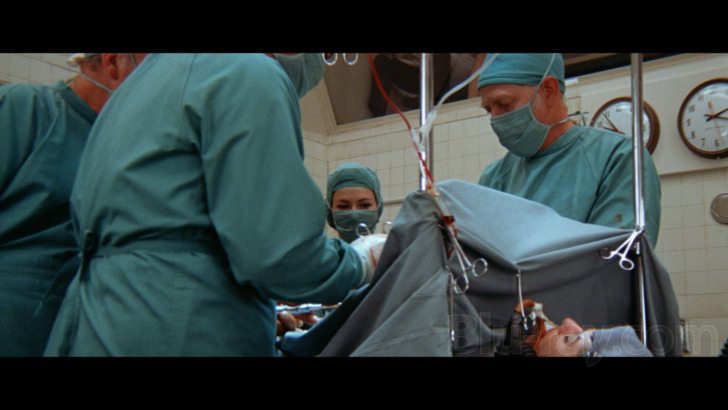
There's less to say about the DTS-HD 2.0 Master audio mix, but not due to any shortcomings. This basic but faithful track preserves The Carey Treatment's original one-channel source audio and boasts very clean and crisp dialogue, a solid dynamic range, and well-mixed background details that make their presence known without fighting for attention. Roy Budd's era-specific score sounds excellent as well, with a respectable amount of weight during key moments. While the overall sonic experience still clearly sounds like a product of its time (very little LFE and a bit thin on the high end), it's an authentic presentation that features no discernible defects and does its job just fine from start to finish.
Optional English (SDH) subtitles are included during the main feature only.
The Carey Treatment Blu-ray Movie, Special Features and Extras 
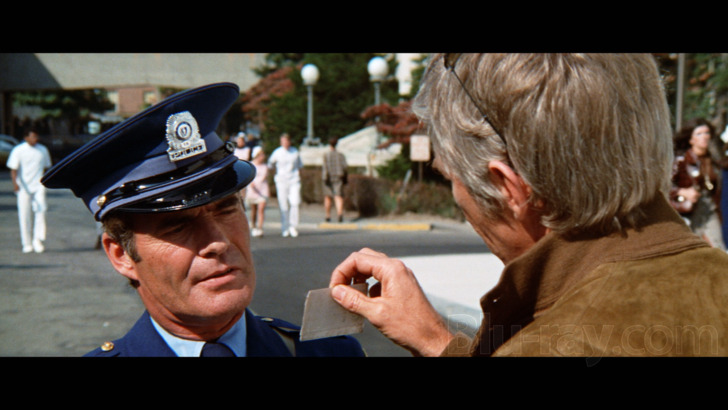
This one-disc release ships in a standard keepcase with poster-themed cover artwork. Extras are minimal.
- Theatrical Trailer (2:15) - This hard-nosed promotional piece can also be seen here.
The Carey Treatment Blu-ray Movie, Overall Score and Recommendation 
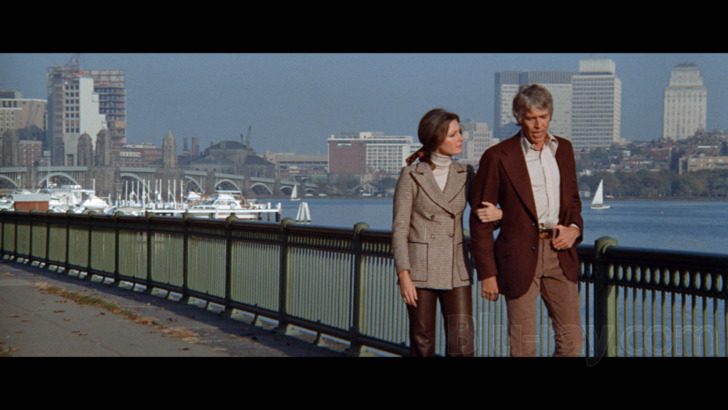
Blake Edwards' notoriously compromised film The Carey Treatment, based on an early book by Michael Crichton, didn't make it through the production process unscathed: it's got an extremely uneven tone and a choppy flow that undercuts its initially promising central narrative. The thin plot is stretched to its absolute breaking point and, while it still works passably enough as a base-level thriller, the main reason to watch The Carey Treatment is for James Coburn's reliably magnetic central performance, which at times is as enjoyably campy as some of the script. Warner Archive's Blu-ray stays the course with another solid disc that favors strong restoration work over bonus features, although in cases like this a breakdown of "the true story" would've been great to see. That said, it's for die-hard fans only.
Similar titles
Similar titles you might also like

The 9th Life of Louis Drax
2016

A Simple Favor
2018

The House of Fear
Sherlock Holmes
1945

The Mirror Crack'd
1980

The Loft
2014

Criminal Law
1988

Jennifer 8
Special Edition
1992

Under the Silver Lake
2018

Deceived
Special Edition
1991

Jagged Edge
1985

Where the Truth Lies
2005

Wild Things: Foursome
Unrated Edition
2010

Physical Evidence
1989

Gemini
2017

Perfect Stranger
2007

Small Town Crime
2017

Green for Danger
1946

Death on the Nile
1978

Deathtrap
Warner Archive Collection
1982

A Perfect Getaway
Unrated Director’s Cut
2009